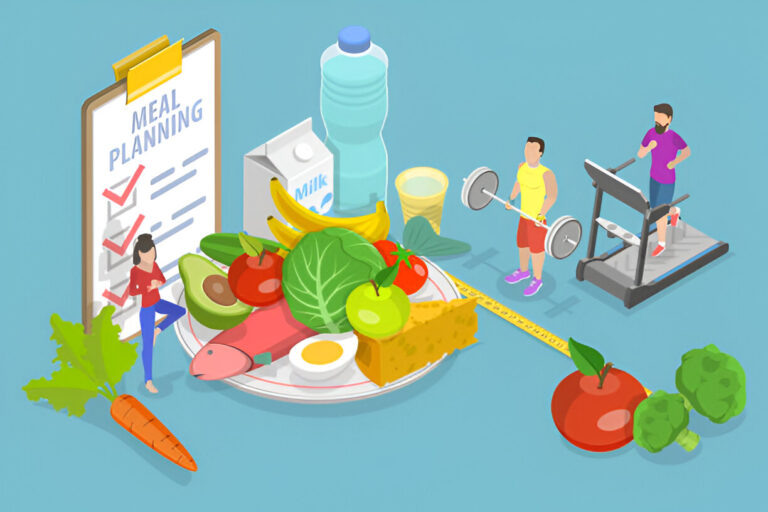Staying healthy involves much more than occasional trips to the gym or eating a salad now and then. True health is a balance between physical activity, nutrition, sleep, and mental well-being. By taking a holistic approach, you can optimize not just how you look but also how you feel and function every day.
Nutrition
Your diet is the foundation of your health, fueling your body and mind. A well-structured approach to eating can make a world of difference.
Balanced Diet Basics
Eating a balanced diet means consuming the right proportions of macronutrients—proteins, carbohydrates, and fats—as well as essential vitamins and minerals. Here’s how to get started:
- Plan Your Plate: Include lean proteins like chicken or tofu, complex carbs such as quinoa or sweet potatoes, and healthy fats like avocados or nuts.
- Add Color: Incorporate a variety of colorful vegetables and fruits. They’re packed with antioxidants, fiber, and other nutrients that boost immunity and energy.
- Avoid Processed Foods: Limit foods high in sugar, salt, and unhealthy fats. These are often loaded with empty calories and can lead to chronic health issues.
Importance of Hydration
Did you know that even mild dehydration can affect your energy levels and mental clarity? Water plays a key role in regulating body temperature, digestion, and nutrient absorption.
- Aim for at least 8 to 10 cups of water per day. Adjust this based on your activity level and the climate.
- Infuse Your Water: Add slices of lemon, cucumber, or mint for a refreshing twist to plain water.
- Monitor dehydration signs like dark urine, fatigue, or headaches.
Supplements: What You Need to Know
Supplements can be helpful, but they’re not a one-size-fits-all solution.
- Always prioritize a nutrient-rich diet over relying on pills.
- Some commonly needed supplements are vitamin D, omega-3 fatty acids, and magnesium, but consult a healthcare professional to determine what your body needs.
- Avoid over-supplementing, as excessive vitamins or minerals can lead to toxicity.
Exercise
Physical activity keeps your muscles strong, boosts your metabolism, and supports mental health. The key is to find a routine that suits your preferences and goals.
Cardio vs. Strength Training
Both forms of exercise are important, but they have different benefits:
- Cardio:
- Benefits include improved heart health, better lung capacity, and calorie burning.
- Examples include running, cycling, swimming, or dance-based workouts like Zumba.
- Aim for at least 150 minutes of moderate cardio weekly.
- Strength Training:
- Builds muscle, strengthens bones, and improves metabolism.
- Include exercises like weightlifting, resistance band exercises, or bodyweight movements like push-ups.
- Aim for two to three sessions weekly, focusing on different muscle groups each time.
Creating a Workout Routine
Structure your workouts for maximum efficiency:
- Start with a warm-up to reduce injury risk.
- Alternate between high-intensity days and rest days to allow recovery.
- Incorporate variety so you stay motivated, e.g., mix yoga sessions with cardio or strength days.
- Track progress through an app or journal or simply by noticing how you feel post-workout.
The Importance of Rest
Don’t underestimate the power of rest and recovery. Overtraining can lead to injury and burnout:
- Include active rest days, like walking or light stretching, to stay active without overexertion.
- Sleep is essential for muscle recovery and hormone regulation. Aim for 7-9 hours of sleep a night to fully recharge.
Beyond
Your physical health is only one part of the equation. Long-term wellness also depends on mental and emotional well-being, sleep, and routine health evaluations.
Mental Wellness and Mindfulness
A healthy mind is the key to a fulfilling life:
- Practice mindfulness techniques like deep breathing, meditation, or journaling for just 10 minutes daily.
- Spend time outdoors. Studies show that being in nature reduces stress and improves mood.
- Cultivate hobbies you enjoy to reduce anxiety and increase happiness.
Sleep Hygiene
Sleep isn’t a luxury; it’s a necessity.
- Establish a consistent bedtime routine. This signals to your body that it’s time to wind down.
- Limit screen time before bed. The blue light from devices can interfere with melatonin production.
- Create an ideal sleep environment with a dark, cool room and comfortable bedding.
Regular Health Check-ups
Routine check-ups aren’t just for when you’re sick.
- Schedule annual physicals to monitor key health markers like blood pressure, cholesterol, and glucose levels.
- Screenings can catch potential health issues early, increasing treatment options and success rates.
- Partnering with a trusted wellness center, such as those in Boise, can provide tailored advice and proactive care for your unique needs.
Conclusion
Improving your health doesn’t happen overnight, but small, consistent changes can have a big impact. By maintaining a balanced diet, staying active, prioritizing rest, and caring for your mental well-being, you’ll be well on your way to a comprehensive approach to health. Remember, it’s not about achieving perfection but rather making progress. Start by incorporating one or two tips from this guide, and build from there. Here’s to a healthier, happier you!

david Miller is an experienced English language expert with a deep passion for helping others communicate effectively and confidently. With a background in linguistics and literature, He provides clear, accessible insights on grammar, writing, and communication strategies. Through well-researched articles and practical advice, David Miller aims to make language learning both inspiring and achievable for readers of all levels.


